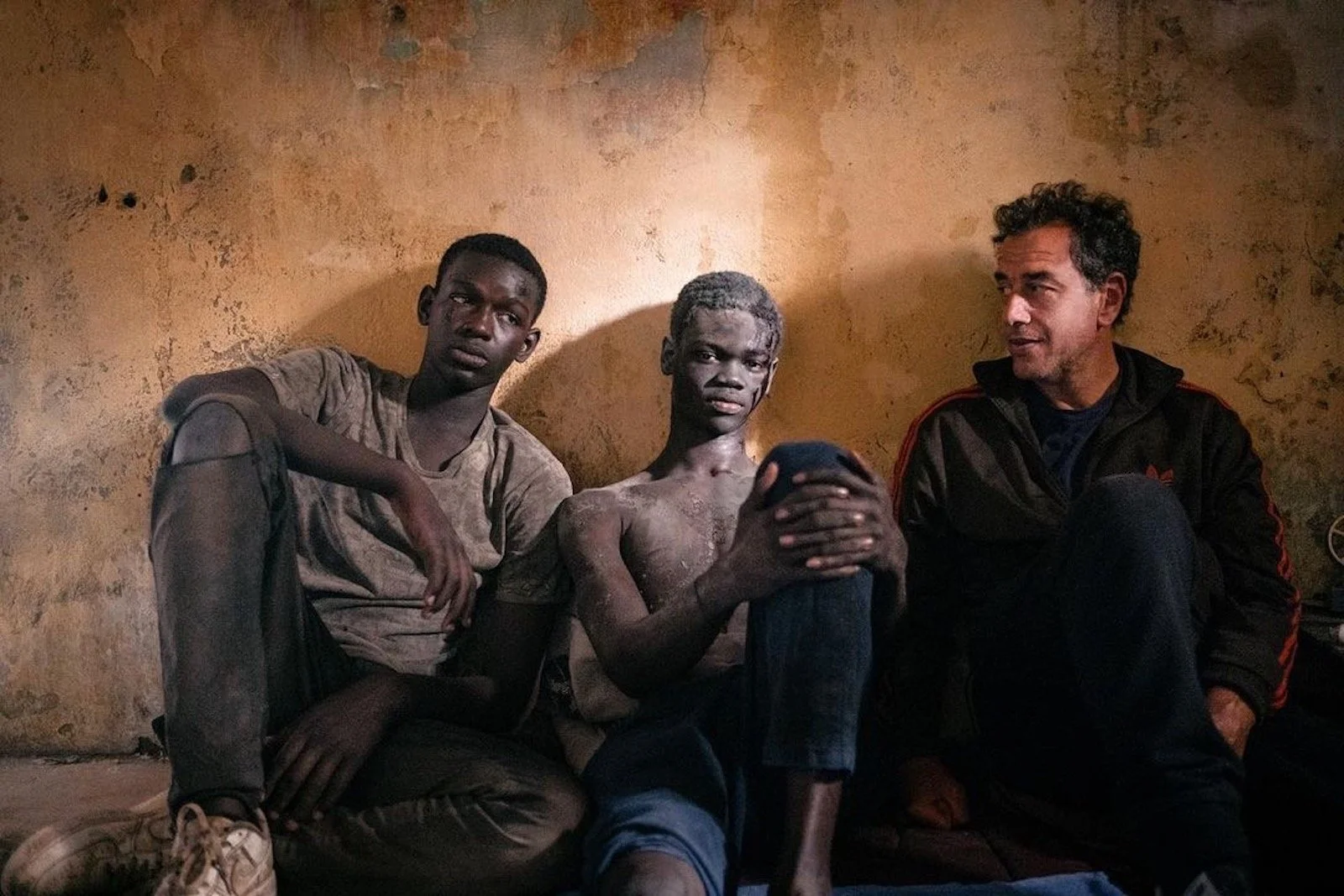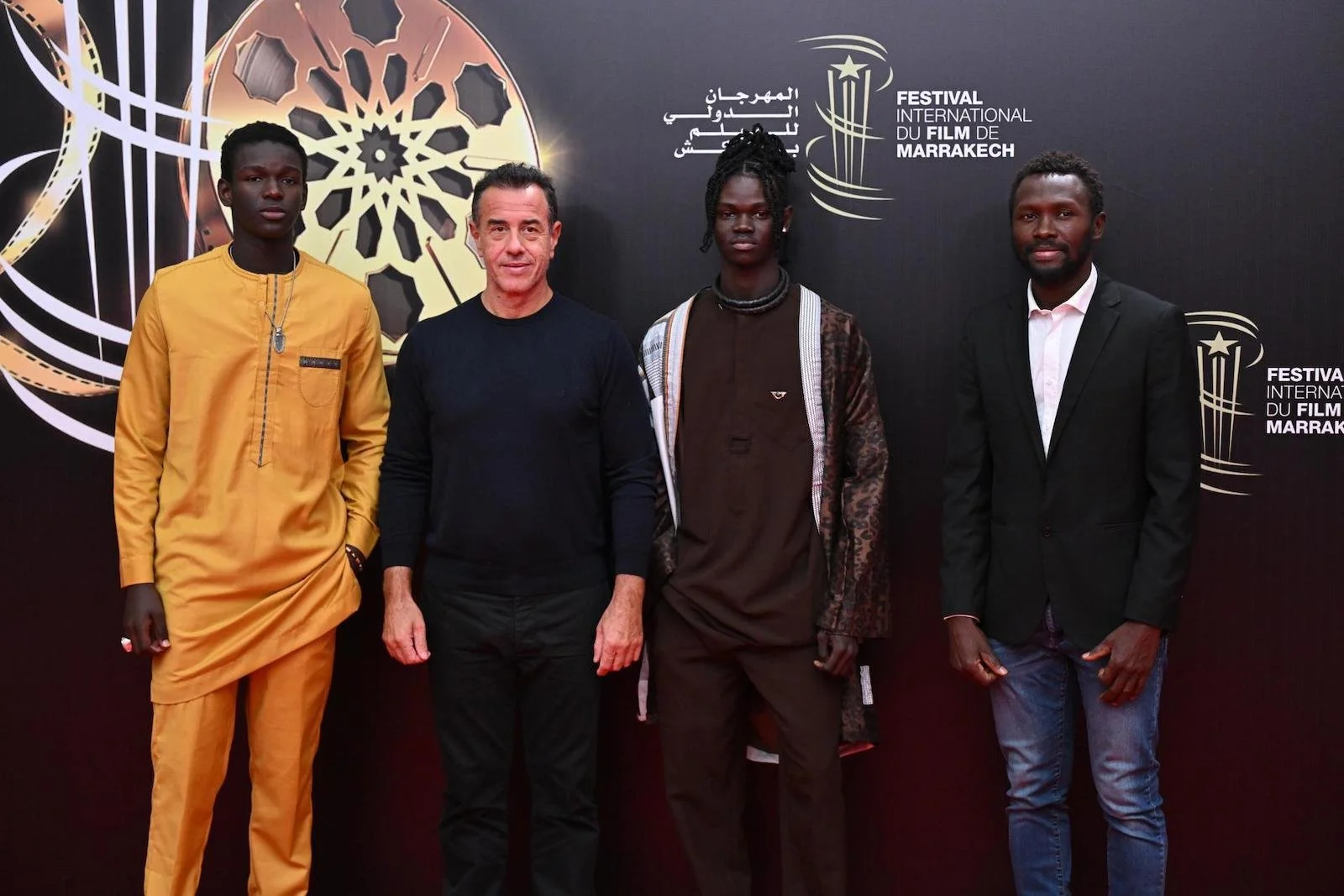The Italian filmmaker stands on the edge of a life changing event, having made the kind of film that not only makes the world a better place, but is also perfectly entertaining for audiences, and proves a critics’ favorite. We caught up during the Marrakech International Film Festival, before the film received its Golden Globes nomination earlier this month. Next stop… the Oscars?
The first thing apparent to anyone who meets Matteo Garrone is his intrinsic kindness. It doesn’t matter if he’s addressing an audience of moviegoers at the Moroccan premiere of his latest film, Io Capitano, which owes so many of its locations to the North African country, or if he is sitting with a group of journalists eager to hear his take on the stunning film, the Rome-born filmmaker is as lovely as his smile betrays.
I remember my first interview with Garrone in Cannes, for Dogman which in 2018 premiered in Competition on the Croisette. Thanks to the late Richard Lormand, the film’s publicist and a dear friend, I sat across from Garrone, side by side with another journalist, and we asked away. At one point, I mentioned having talked earlier with his actor Marcello Fonte and interjected something he had told me about the shoot. “Maybe you could talk for me,” Garrone said, flashing his famous white toothed smile. “I’m a bit tired and you know so much about the film!” He said it in jest of course, not mean spirited at all, and never made me feel like the know-it-all I’ve often been accused of being. By more mediocre men.
This time around, he’s talking about another underdog story, the almost “fairy tale” — I use Garrone’s exact words here — of two young men, Seydou and Moussa who leave Dakar, Senegal for Europe and take the audience on the unforgettable journey of Io Capitano. The film world premiered in Venice in September of this year, where it won 12 whole awards, including the Marcello Mastroianni Award given to the Best Young Actor for Seydou Sarr and the Silver Lion for Best Director for Garrone himself.
Garrone, the son of theater critic Nico Garrone and photographer Donatella Rimoldi, first surfaced onto world cinema lovers radars with Gomorrah. The 2008 title, based on the writings of Roberto Saviano about the Neapolitan “Camorra,” the local mafia, premiered in Cannes and went on to win the Jury Prize at the festival. It then went on to sweep the Donatello awards, the Italian Oscars, in 2009 and was nominated for a BAFTA, a BIFA and the Golden Globes that same year.
His next film, Reality, which also premiered in Cannes three years later, seemed to hit too close to home for the critics, with its story of a simple working man in Naples who becomes obsessed with being in the public eye, and participating on a hit reality show. It was famously booed in Cannes and never enjoyed the success its subtle, but important message deserved.
Garrone followed that with his largest scale project yet, a grand fable told in shades of humanity titled Tale of Tales. The film was based on the the seventeenth-century Neapolitan fairy tale collection, “Lo cunto de li cunti” by Italian poet and courtier Giambattista Basile and starred major movie stars like Salma Hayek, Vincent Cassel, Toby Jones and Stacy Martin.
In between his acclaimed festival favorites, Garrone also occasionally works on short films, which include a couple of cool collaborations with Maria Grazia Chiuri at Dior, featuring the maison’s latest collections, one short for Dolce & Gabbana and another for Italian drinks company Campari.
In Morocco, Io Capitano, Garrone’s latest enjoys its African premiere and Garrone admits he has “no idea” what the Marrakech audiences’ reaction would be, during our interview. “If we were in Dakar, on the 5th of January,” where Io Capitano will enjoy its Senegalese premiere, “I would be very confident,” Garrone continues, “Morocco, I can’t say.”
What the Italian filmmaker can say is that the country we are in feels “very familiar to me,” having shot for “at least two months in Morocco, including the scenes in “Libya, which we shot in Casablanca, the desert, which we shot in Erfoud and Agadez, Niger, which we shot close to Erfoud.”
When asked if the story is inspired by real events, Garrone answers, “yes of course, have you met Mamadou?” referring to Mamadou Kouassi Pli Adama, who is listed as one of the “collaborating writers” on Io Capitano, and has joined Garrone, actors Sarr and Moustapha Fall in Marrakech. “He’s one of the three guys who inspired the movie with his life and his experience,” Garrone explains, continuing “every frame of the movie is connected with some real story, of someone who really lived that experience.”
Miraculously, Io Capitano has managed to steer clear of critiques of “cultural appropriation,” an accusation we seem to love so much in this age, and Garrone perhaps offers the reason why. “I tried to tell this story, to be a sort of intermediator entering a culture that is not mine, because it is not mine, by making the movie together with them — trying to give to you, the viewer, finally the emotional experience of what it means to make that journey.”
In fact, in Io Capitano, the filmmaker finally explains what it’s like to entertain the impossibility of crossing countries, a desert, warring lands and the open seas “from the other point of view, a reverse shot of what we are used to seeing — we see always boats arriving, the last part, the numbers.”
My own family betrays a strong tradition of migrants. From my maternal grandfather who moved from Naples to Milan for his work — granted as a stockbroker but nevertheless, he became what the Italians call “un pendolare,” a commuter. To my paternal grandparents who escaped the Nazis in mid-1930’s Germany just as the SS magazine Das Schwarze Korps published an article about granddad Hans’s “liberal witticisms” proving enough for a “one way ticket to the nearest concentration camp,” for the Shakespeare translator.
And then, more recently, my own parents’ move to the US, then back, then over one more sea, or rather a channel, just to find that something, what we all are always looking for…
“Behind these numbers are human beings,” Garrone continues on the thought above, “human beings who are exactly like us, with the same desires — to move, to look for a better life, to discover the world.” Like looking in a mirror really. Only that mirror holds up the similarity of the power of humanity, not the reflection of our different skin tones. And what that entails, as far as privilege.
“To be authentic, I’ve done the movie with them, together,” Garrone admits, about all his collaborators, writers, actors, extras, whose stories he tells in Io Capitano. And in the process, manages to instruct us about human rights and how those change, depending on where we live, and the color of our skin. Don’t mistake this for a documentary though, as Garrone’s forte is always his fable-like look and tone, the way he turns the ordinary, even the tragic, into something magical.
Just as an aside of what happens everyday if traveling while Black, during the 80th Venice International Film Festival, Cameroonian casting director Henri-Didier Njikam was denied an entry visa by the Italian Embassy in Rabat, Morocco, because they said there were no guarantees that he would leave Italian territory once he entered. The matter was reported in The Hollywood Reporter Roma.
About being the Italian Oscar submission, Garrone admits “we are very proud to be the Italian nomination, and then adds, “of course in this movie there is a lot of Italy but also a lot of Africa.”
Garrone sees the Academy Awards as a means to spread the message. “I think the Oscar is the most prestigious prize for cinema and can be very important for giving an opportunity to the movie to reach a larger part of the audience — the further we go the bigger will be the possibility to reach the largest audience,” he says.
Undeniably, there is a good chance that Io Capitano may end up sweeping up awards season. It is already nominated for the Golden Globes, in the Best Foreign Language category, and stands a good chance of being shortlisted for the Oscars, in the international feature race. Garrone explains the appeal of this magical film, which feels like a fairy tale but features characters who go about their perilous journey in an epic, heroic way. “We have already had screenings in the States and realized this is a movie that can have a very strong reaction in the audiences there. First of all it’s the journey of the hero and the structure is very classic. And maybe [because] all the people who live in the States are migrants — they went for a better life in the past, or recently — so it’s a sort of promised land. And also it talks about slavery, modern slavery, and it’s a subject that especially the African American community feels very close to.”
Ultimately, Garrone explains, Io Capitano “talks about an injustice — why our sons if they want to go can take a plane and they,” the African migrants, “if they want to move, have to risk their lives?”
As the filmmaker points out, in the last 15 years, over 27,000 people have died making the journey, and this year alone, 2,000 have perished already.
I inquire if Garrone was ever afraid of the “cultural appropriation” label, in making an African story. “This for me, is the most popular movie [I’ve made] because it’s very clear who is the hero and who are the enemies. In other movies these lines are more blurred. It’s not so black and white,” Garrone explains. “After a few minutes you are with Seydou, because he’s so innocent, so human. And you make the journey with him,” he continues.
“When I make a movie in Italy, because of course I grew up there, I absorb the culture. For this reason it was very, very dangerous for me to make a movie in a culture that was not mine,” Garrone says about Io Capitano and continues, “I was very worried and it took years to make the decision to make this movie.”
He also pondered “the risk to use again, the “poor migrants” from my point of view of an Italian bourgeois… In the end I decided to make this movie because I felt that it was missing, this story — from this POV.”
He adds, about his fearless collaborators, “in every part of the creation I was with them — I had this privilege. I have done the movie, asking, watching, seeing them.”
The result is a masterpiece that needs, craves to be watched. Beautifully shot, and perfectly told, managing to steer clear of the kind of violence that may keep the younger audiences away. Because, Garrone tells us, he found a lot of his adult audiences through the school children who watched the film in screenings around Italy — “we have screenings scheduled in schools until April of next year,” he says. And those kids then went home to tell their parents, arriving at an audience that may never have watched Io Capitano otherwise.
Will Garrone ever make a film featuring a woman protagonist? “I would love to do that,” he replies and explains that in Io Capitano, “I did try to make some strong women characters.” But, the smart filmmaker who also co-writes and co-produces his own films, “there is a lot of women directors who make movies about women.”
Image of the team at the Marrakech International Film Festival, used with permission.

